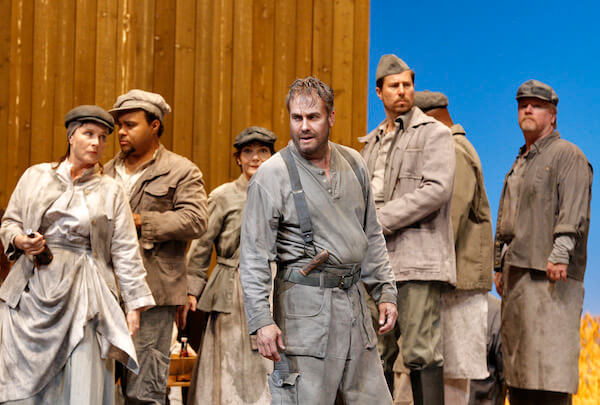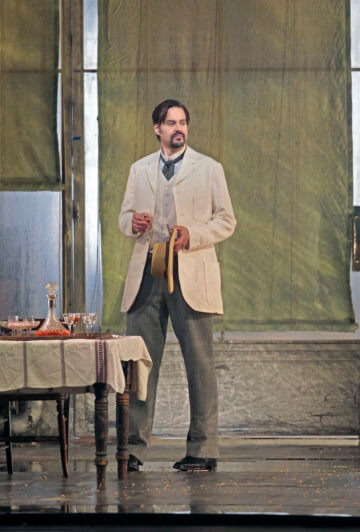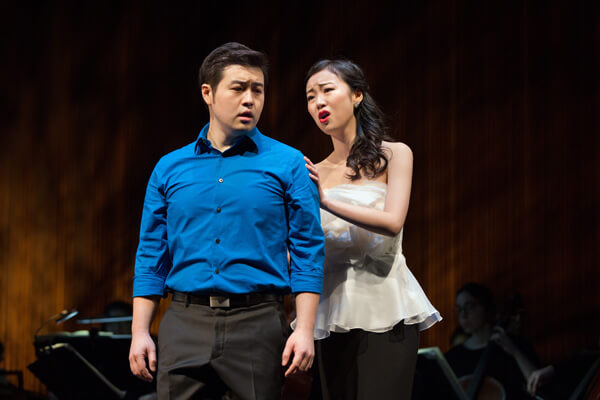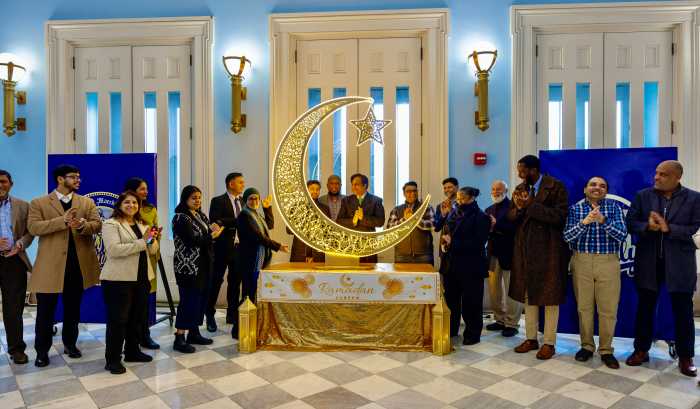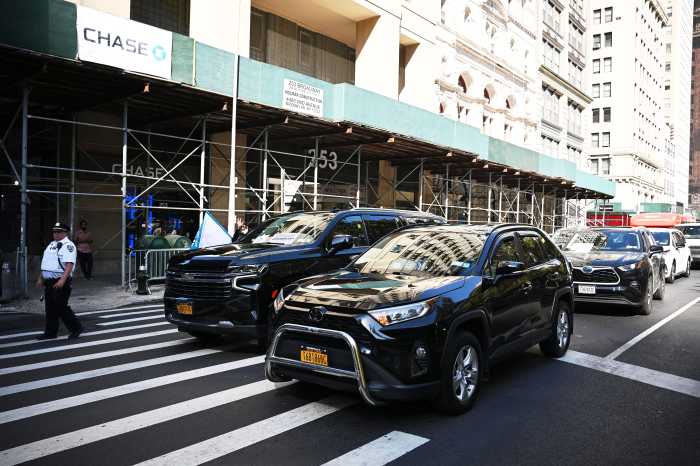Mariusz Kwiecien in San Francisco Opera’sProduction of Verdi’s “Don Carlo.” | CORY WEAVER/ SAN FRANCISCO OPERA
BY DAVID SHENGOLD | It’s delightful to be in San Francisco in June, with Frameline’s massive LGBTQ film festival just the pinnacle of Bay Area cultural events for a diverse community. This year’s San Francisco Opera line-up offered appealing prospects in three of the greatest operas ever written: “Don Carlo,” “Jenufa,” and “Carmen” — the Verdi and Janácek works superbly cast and the Bizet billed as the first production by Catalan superstar director Calixto Bieito to be brought to the US.
Seen June 17, “Carmen” proved enjoyable but no revelation. Carlo Montanaro conducted episodically, with some odd tempo choices. The staging — credited to Joan Anton Rechi — emerged as “based on” Bieito’s Catalan version. Judging from videos and still footage, it evoked a Broadway bus-and-truck reduction, though the trademark five classic Mercedes cars made their trademark appearance. Bieito/ Rechi made much amusing — and also macabre Tarentinoesque — use of them. From the program — if nothing else — we learned we were at Ceuta, one of Spain’s North African enclaves. It was a relief to be spared the usual tourist office Iberian “local color,” but little in the direction of performers or chorus seemed either novel or insightful, save that Micaela — the miscast Erika Grimaldi, sounding like late-career Licia Albanese — came across tougher than the usual blonde ingénue. Far too much extra-musical noise prevailed, including deeply unmusical howls of forced laughter. It wasn’t a bad performance by any means, just unmemorable.
Best of the leads was Brian Jagde, more at home in the final act’s rigors and trumpeted anger than in José’s initially needed lyricism — though he found airy head voice for the climaxes of the duet with Micaela and his Flower Song. This sturdy spinto tenor seems to be treading successfully on the James King career path, an admirable goal. Michael Sumuel’s soft-grained bass-baritone with its appealing light tremolo was also miscast in Escamillo’s music — he had the bottom but not the top notes of the ever-betraying Toreador Song and succeeded only in the final duettino; nothing in his stage presence suggested “bullfighter.”
Among San Francisco’s June wonders is opera
Stage presence figured large in Ginger Costa-Jackson’s title anti-heroine, an impersonation boasting considerable virtues. Beyond looking hot, she showed good French and a thorough textual understanding. The voice itself is usefully vibrant and of sufficient range. What it lacks are the sheer quality and quantity of sound to be satisfying on a large international stage: she too often resorted to Sprechgesang. Costa-Jackson would be totally valid in a small house with a largely Opéra-Comique version, or in Peter Brook’s “La Tragédie de Carmen.”
The small role casting showed the limits of the near-omnipresent practice of using company “Young Artists” in parts needing some seasoning. But Renée Rapier sang an excellent Mercédès; plus, having that sidekick have a little daughter observing Carmen and her friends’ misdeeds proved the most interesting thing about the staging.
Olivier Tambosi’s “Jenufa” staging, which has played somewhat equivocally at the Met, worked much better in this space (June 19), with keener, more detailed dramatic action possible. This was a spectacular performance that operagoers anywhere in the world would have been lucky to hear. Major credit goes to conductor Jirí Belohlávek, stylish and authoritative on Janácek’s tricky dynamics and rhythms. The orchestra sounded world-class.
William Burden in San Francisco Opera’sproduction of LeoÅ¡ Janácek’s “Jenufa.” | CORY WEAVER/ SAN FRANCISCO OPERA
So did Karita Mattila, even finer as Kostelnicka than she’d been as Jenufa in this staging. A staged role debut, Mattila’s visceral performance in largely radiant tone was a triumph. William Burden’s Laca scored one, too, masterfully helming a beautiful lyric sound through the music’s rigors via excellence in phrasing, articulation, and dynamic shading. His difficult character was built surely and subtly. Malin Bystroem acted an unusually feisty heroine with similar detail and appeal — probably the most convincing Jenufa visually I’ve ever seen — and sang prettily if with insufficient oomph in the middle to dominate ensembles.
Scott Quinn aced the macho golden boy Steva, portrayed as a cringing physical coward when not swaggering. Unlike most Stevas, he vocalized attractively. Here again, young singers impersonated mature characters, but virtually everyone sang well — Laura Krumm (Maid), Matthew Stump (Foreman) and clarion-voiced Toni Marie Palmertree (Barena) fared very strongly. Reader, I went back to hear it again.
“Don Carlo” on June 21 also enjoyed international-level casting, save for Andrea Silvestrelli’s vibrato-with-a-voice-around-it Inquisitor, insecure at both range extremes and lacking gravitas. Outgoing music director Nicola Luisotti, once promising, gave a fitful, pace-challenged, and often overloud account of Verdi’s wonderful score, with too many brass flubs for comfort. Sometimes his reading snapped into focus, but the conductor’s reflex ovations were Chicago-style Bartoletti Syndrome: “He’s Italian and he’s ours, so it must be good.” Ian Robertson’s chorus held its own. Emilio Sagi’s staging was crammed with little realistic touches — Princess Eboli seemingly figuring in every palace intrigue — with wildly varying success.
The unhappy regal pair took the highest honors. Ana María Martínez’s first Elisabetta showed how a first-rate lyric soprano can successfully approach this spinto role. Like Burden, Martínez maximizes her musical effect through expert phrasing. The second verse of her Romanza was barbarically cut, but her dead-on attacks, aerial piano singing, and emotional connectedness made her contributions to the Quartet and final duet unforgettable. René Pape’s bass showed considerable velvet sheen and elegant dynamic play; purely as singing and star presence, he impressed. One missed, however, the philosophical depth and linguistic connection of Ferruccio Furlanetto (slotted to sing the final performance).
Michael Fabiano made a much stronger figure of Carlo than is usual; the tenor’s middle voice was liquid and breathtaking, but worryingly he forced many top notes, to the detriment of line. Greatness alternated with unbridled Corelli-imitation in his vocalization. Fabiano seems to be following John Daszak’s (bad) example of insisting on appearing bald no matter what the period or role demands.
Mariusz Kwiecien mercifully didn’t blast; if oversinging has somewhat grayed the timbre, he can still access bel canto elegance, including trills, when needed, and much of Posa’s music was handsomely and movingly presented. Kwiecien and Sagi had Posa anticipate a different object (himself) of Carlo’s confession of “guilty love” when they met: a touch I’ve always hoped to see.
As Eboli, Nadia Krasteva’s fundamental instrument is in a lower league technically and timbrally but she more than pulled her weight in terms of vital characterization. Krasteva knows her business. Matthew Stump — looking decades too young — sang a trenchant Monk. Pene Pati showed a mettlesome tenor as Lerma, William Burden’s 1992 debut role locally. Whatever its lapses, this “Don Carlo” made for a second exciting night at SFO
David Shengold (shengold@yahoo.com) writes about opera for many venues.

